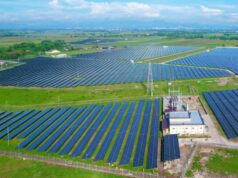NEGROS Island Biomass Holdings Inc. hopes to have three operational biomass plants this year and avail of the benefits offered by the government’s feed-in tariff (FiT) scheme.
San Carlos BioPower, Inc., one of the three biomass plants, achieved a power generation level of 20 megawatts (MW) on Sept. 21. It is said to be the first in the world to purely run on sugarcane waste material.
Two more biomass power plants — North Negros BioPower, Inc. with 25 MW and South Negros BioPower, Inc. with 25 MW — will be connecting to the grid within this year. The P16-billion project is funded by global investment firm ThomasLloyd Group Ltd.
Arthur N. Aguilar, president of the BioPower projects, said in a statement that San Carlos BioPower “has accomplished its proof of concept from the logistical system of sugarcane trash collection to the conversion to electricity.”
The plants, which will generate 70 MW of baseload capacity, are to be fueled mainly by sugarcane field residues sourced within Negros.
“The team is pleased to finally have (San Carlos BioPower) connect and export power to the grid. Our goal is to have all three of our plants running by end of this year and improve the quality of power in the island of Negros,” Mr. Aguilar said.
The plants will be supported by 12 company-owned and -operated transloading stations in Negros to annually collect and use more than 610,000 tons of feedstock.
“We have among the largest agricultural fleets to have sufficient collection capabilities for fuel inventory, while also having around 1,500 employees to support our day-to-day operations,” Mr. Aguilar said.
The biomass plants’ use of cane byproduct is expected to provide 510 gigawatt-hours of energy in its first year of operation. They are estimated to power 160,000 homes and reduce carbon dioxide emissions by 57,680 tons.
The holding firm said the biomass projects in Negros have provided development in host communities, while raising farmer incomes.
“BioPower’s collection of cane trash is as important as bagasse feedstock for fuel. It adds value to diversifying the sugar industry and mitigates the practice of open field burning, without additional investment from planters,” it added.
The biomass plants are vying to be eligible for FiT, an incentive scheme that grants priority connections to the grid, priority purchase and transmission of, and payment for, electricity generated from renewable energy sources wind, solar, ocean, run-of-river hydropower and biomass.
Under the rules, eligible RE developers are guaranteed a rate for 20 years for each kilowatt they produce. — Victor V. Saulon



